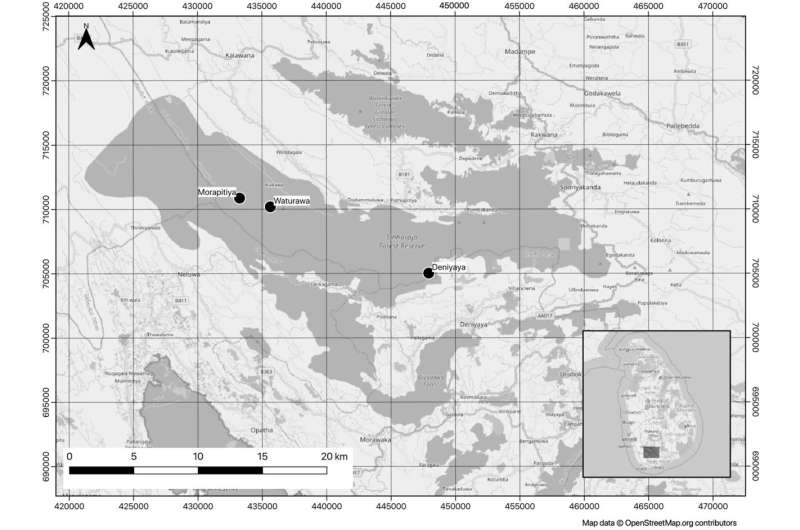This article has been reviewed according to Science X's editorial process and policies. Editors have highlighted the following attributes while ensuring the content's credibility:
fact-checked
trusted source
proofread
Climate change threatens resilience of Sri Lankan rainforests

Tropical ecosystems store over half of the world's above-ground carbon in their biomass, making them critically important in the global fight against climate change. As carbon dioxide levels continue to rise in the atmosphere, scientists are questioning whether climate change will enhance carbon sequestration through accelerated tree growth or expose rainforests to warmer, drier climates that could increase water stress, suppress tree growth, and dry out soils.
To examine how climate change is affecting tree species and carbon sequestration in tropical forests, Mark Ashton, Morris K. Jessup Professor of Silviculture and Forest Ecology at the Yale School of the Environment, along with a team of scientists calculated above-ground biomass from tree plots in the Sinharaja Forest Reserve in Sri Lanka over a 40-year period.
The area has remained undisturbed by economic activity, offering the opportunity to determine trends in biomass, and the forests are notable for harboring the highest amounts of carbon of all tropical forests, making them a particularly critical source of climate change mitigation.
The Sri Lanka plots examined by the team are dominated by dipterocarp, a tall forest tree in Southeast Asia, and are home to Ceylon ironwood (Mesua nagassarium), a slow-growing tree species valued for their dense wood.
The study, the first of its kind to examine above ground biomass for mixed dipterocarp forests, found that some of the long-lived, slow-growing tree species that characterize the forests are declining. Rather than acting as stable carbon sinks, some Sri Lankan forests affected by climate change are now carbon sources, the authors concluded in the study published in Forest Ecosystems.
"There's a lot of emphasis on the ability of growing forests to sequester carbon, but studies of old forests with especially large trees that sequester carbon and mitigate climate are few and far between," Ashton said. "The studies that do exist are based on relatively short time spans and don't really take into account the fact that climate change itself is affecting these forests. There's growing evidence that old forests might be more susceptible to the impacts of climate change than younger forests."
Between 1978 and 2018, there was an average decline of 17% in biomass across three sites in the forests, with Ceylon ironwood accounting for the highest proportion of that decline, the scientists found. Late-successional, slow-growing trees contributed to the largest declines, releasing their stored carbon as they expired. Drought episodes as a result of climate change, along with fungal pathogens, likely killed the trees, the scientists said.
Ashton and the co-authors said the study highlights the importance of protecting and managing the rain forests so they can continue to function as carbon sinks and build resilience to climate change, insects, diseases, and land use conversion.
"A lot of people think that the sheer diversity of rainforest tree species makes them very resilient," Ashton said. "But that's not necessarily true. If only a handful of species, all related to one another, occupies the biomass—the way dipterocarps do—that makes them similarly susceptible to the same diseases, insects, and other disturbances."
The research team included lead author Sisira Ediriweera, professor of applied sciences at Uva Wellassa University, and YSE doctoral students David Woodbury and Arun Dayanandan.
More information: Sisira Ediriweera et al, Old-growth mixed dipterocarp forests show variable losses and gains in aboveground biomass and standing carbon over forty years, Forest Ecosystems (2023). DOI: 10.1016/j.fecs.2023.100163
Provided by Yale University




















